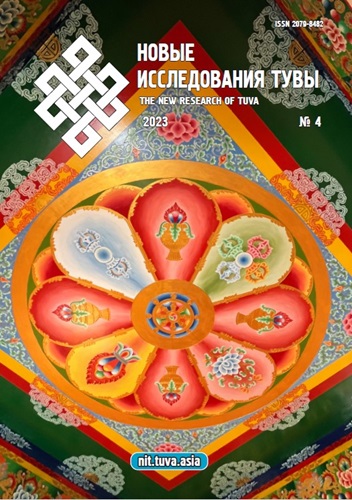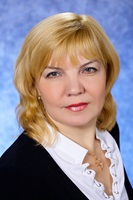Linguoculturological aspect of biblical translations into Turkic languages (a case study of Bashkir and Tuvan)
DOI:
https://doi.org/10.25178/nit.2023.4.4Keywords:
Bashkir language; Tuvan language; Turkic languages; linguoculturology; sacred text; BibleAbstract
Sacred texts of global religions play an important role in the formation and development of the cultures of the peoples who profess them. They set the contours of the national conceptual framework, form a system of precedent images, words and expressions and directly influence stylistic standards. Translations of these texts into new languages are not only vivid examples of intercultural dialogue, but also contribute to the activation of the lexical, grammatical, derivational and stylistic resources of these languages, the formation of new layers of vocabulary and phraseology, and the expansion of their sphere of concepts.
Due to the fact that the translation of sacred texts takes place simultaneously in three dimensions — the properly linguistic (translation as a recoding of information), cultural (translation as a means of intercultural dialogue) and religious (translation as a means of forming a religious worldview) ones — its study by the methods of linguoculturology seems to be productive and relevant. Although translations of biblical texts into the Bashkir language have been carried out since the late 19th century, and into Tuvan since the 1990s, translated biblical texts in these languages have not become objects of a linguoculturological analysis before. Their contrastive analysis is rarely performed. All these make such a research innovative.
The linguoculturological study of biblical texts is based on the identification of three layers of culturally significant information in them: culturally specific linguistic units that denote the realities of the region and the era of the events described, culturally specific linguistic units that are characteristic of the language from which the translation is made (in the 19th — early 20th century, the translation into Bashkir was carried out from the Russian synodal text), culturally specific units of a target language itself. The selection of such units, ways of their interpretation in a target language, an approach to borrowings from an original language and a mediator language are also culturally determined, as they depend on the worldview and theological position of a translator who is inevitably the bearer of a certain culture. The linguistic and cultural analysis of translated biblical texts also demonstrates cultural dynamics and its reflection in a language: ancient texts are not only recoded by means of a new language, but are also adapted to the requirements of the historical period every time.
References
Vorobyev, V. V. (2008) Lingvokul'turologiia [Linguoculturology]. Moscow, RUDN University. 336 p. (In Russ.).
Dongak, U. A. (2020) Novatorstvo pisatelia-bilingva Eduarda Mizhita (tuvinskaia poeziia) [New poetic methods in the literary imagination of the bilingual writer Eduard Mizhit (Tuvan poetry)]. Polylinguality & Transcultural Practices, vol. 17, no. 4, pp. 462–474. (In Russ.). DOI: https://doi.org/10.22363/2618-897X-2020-17-4-462-474
Cassuto, P. A. and Porkhomovskiy, M. V. (2020) Imena Boga v turetskikh versiiakh Vetkhogo Zaveta [Names of God in Turkish versions of the Old Testament]. Vostok. Afro-Aziatskie obshchestva: istoriia i sovremennost', no. 2, pp. 177–186. (In Russ.). DOI: https://doi.org/10.31857/S086919080009064-7
Kirillova, Z. N. (2016) Perevod Biblii na tatarskii iazyk kak mezhkul'turnyi i mezhreligioznyi dialog mezhdu narodami [Translation of the Bible into Tatar language as cross-cultural and interreligious dialogue between the peoples]. Dinamika iazykovykh i kul'turnykh protsessov v sovremennoi Rossii, no. 5, pp. 679–683. (In Russ.).
Kuzhuget, Sh. Yu., Suvandii, N. D., Dambaa, Sh. V. and Lamazhaa, Ch. K. (2019) Kontsept tөrel ‘rodstvennik’ v iazykovoi kartine mira tuvintsev [The concept of төрел (‘relative’) in the Tuvan linguistic world picture]. The New Research of Tuva, no. 3, pp. 149–157. (In Russ.). DOI: https://doi.org/10.25178/nit.2019.3.12
Lamazhaa, Ch. K. (2012) Tezaurusnyi podkhod k analizu tuvinskoi kul'tury [Thesaurus approach to analysis of the Tuvan culture]. The New Research of Tuva, no. 1, pp. 25–46. (In Russ.).
Lamazhaa, Ch. K. (2021) Osnovnye problemy issledovaniia rodstva i rodstvennykh grupp sovremennykh tuvintsev: pasportizatsiia, terminologiia i podderzhanie rodstva [The main issues of the study of kinship and kin groups of contemporary Tuvans: Passportization, terminology and maintenance of kinship]. The New Research of Tuva, no. 4, pp. 6–21. (In Russ.). DOI: https://doi.org/10.25178/nit.2021.4.1
Leontieva, S. A. (2018) Bibliia na iakutskom iazyke [The Bible in the Yakut language]. Sbornik trudov Iakutskoi dukhovnoi seminarii, no. 5, pp. 134–135. (In Russ.).
Mainy, Sh. B. (2023) Predstavleniia o cher ‘zemle’ sovremennykh tuvintsev [Perceptions of ‘cher’ (‘earth’) among contemporary Tuvans]. The New Research of Tuva, no. 1, pp. 38–63. (In Russ.). DOI: https://doi.org/10.25178/nit.2023.1.3
Mizhit, L. S. (2016) Perevod Biblii na tuvinskii iazyk: obogashchenie leksicheskogo sostava tuvinskogo literaturnogo iazyka [The Tuvan Bible translation and the lexical enrichment of the Tuvan literary language]. Rodnoy yazyk: lingvisticheskii zhurnal, no. 1 (4), pp. 141–155. (In Russ.).
Saitbattalov, I. R., Lukmanova, R. Kh. and Saitbattalova, Yu. A. (2022) Teonimicheskaia leksika v perevodakh Evangelii na bashkirskii i tuvinskii iazyki [Theonymic vocabulary in Bashkir and Tuvan translations of the Gospels]. The New Research of Tuva, no. 4, pp. 137–145. (In Russ.). DOI: https://doi.org/10.25178/nit.2022.4.11
Saitbattalov, I. R., Fatkullina, F. G. and Saitbattalova, Yu. A. (2017) Perevod v kontekste mezhkul'turnogo dialoga [Translation in the context of dialogue of cultures]. Vestnik Bashkirskogo universiteta, vol. 22, no. 3, pp. 778–784. (In Russ.).
Studentsov, O. R. (2013) Imena sushchestvitel'nye, obrazovannye affiksom -çă(-çĕ), v chuvashskikh pravoslavnykh tekstakh kontsa XIX — nachala XX v. [Nouns formed by -çă(-çĕ) affix in Chuvash Orthodox texts of the end of XIX — the beginning of XX centuries]. Vestnik Chuvashskogo gosudarstvennogo pedagogicheskogo universiteta im. I. Ia. Iakovleva, no. 1–2 (77), pp. 164–167. (In Russ.).
Suvandii, N. D. (2023) Cher ‘zemlia’ v paremiiakh tuvintsev [Cher ‘earth’ in Tuvan paroemias]. The New Research of Tuva, no. 1, pp. 26–37. (In Russ.). DOI: https://doi.org/10.25178/nit.2023.1.2
Khomushku, A. V. (2018) Kontsept «Rodina» v tuvinskikh poslovitsakh i pogovorkakh [The concept of Motherland in Tuvan proverbs and sayings]. In: Aktual'nye problemy issledovaniia etnoekologicheskikh i etnokul'turnykh traditsii narodov Saiano-Altaia [Current issues of research into ethnoecological and ethnocultural traditions of the peoples of the Sayan-Altai region] : Proceedings of the 5th International research-to-practice conference of young researchers, postgraduates and students (Kyzyl, June 26–29, 2018) / ed. by U. V. Ondar. Kyzyl, Tuvan State University Publ. 235 p. Pp. 27–29. (In Russ.).
Fatkullina, F. G., Vorobiev, V. V., Saitbattalov, I. R., Peshkova, N. P. and Suleymanova, A. K. (2022) Toponyms as units of cultural and linguistic transfer: A linguistic and cultural aspect. Journal of Language and Linguistic Studies, vol. 18, special issue 2, pp. 884–890. [online] Available at: https://jlls.org/index.php/jlls/article/view/3983 (accessed 10.07.2023).
Published
How to Cite
For citation:
Vorobyev V. V., Fatkullina F. G. and Saitbattalov I. R. Lingvokul’turologicheskii aspekt bibleiskogo perevoda na tiurkskie iazyki (na materiale bashkirskogo i tuvinskogo) [Linguoculturological aspect of biblical translations into Turkic languages (a case study of Bashkir and Tuvan)]. New Research of Tuva, 2023, no. 4, pp. 61-69. DOI: https://doi.org/10.25178/nit.2023.4.4
Issue
Section

This work is licensed under a Creative Commons Attribution-NonCommercial 4.0 International License.

Author(s) license holder(s) grant rights for their work to the journal (grantee of a license) under the simple non-exclusive open license in accordance with Art. 1286.1 «Open license for a research work, work of literature or fine arts», Civil Code of the Russian Federation.
New Research of Tuva publishes articles under the Creative Commons Attribution-NonCommercial license (CC BY-NC).
Since it is an open license, author(s) reserve the right to upload the article to their institutional repository, submit it to another journal (if it allows republications), or republish it on their own website (in full, or in part).
However, several conditions apply here:
a) The republished version must always contain the name(s) and affiliation(s) of the author(s), the original title and the hyperlink to the original version on the New Research of Tuva website;
b) It must be in open access, free of charge, and no category of readers must be in any way whatsoever advantaged over general readership.
c) should the contribution be submitted elsewhere by its author(s) without substantial modification (30% or more of original text unchanged), the body of the article should contain a disclaimer that the original version was published in New Research of Tuva (with a link to the respective page)
The CC-BY-NC is a non-revocable license which applies worldwide and lasts for the duration of the work’s copyright.











